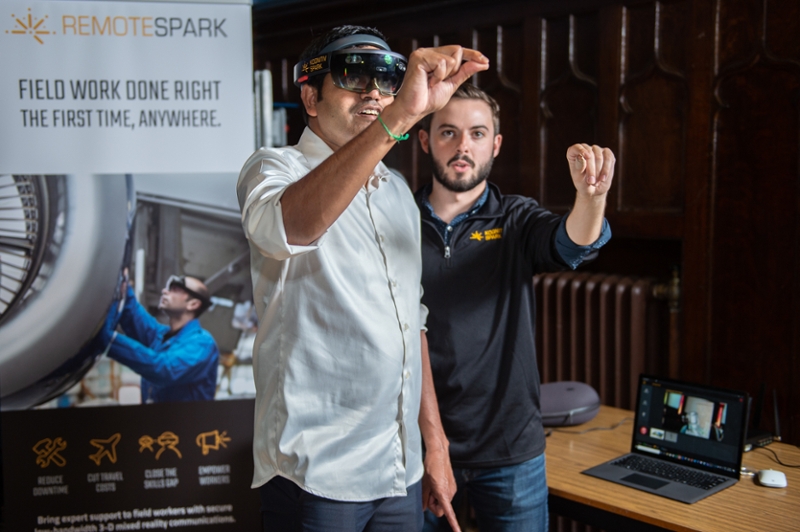UNB researchers adding a new dimension to ocean exploration
Author: UNB Research
Posted on Sep 9, 2021
Category: Innovation & Commercialization , Research , Partnerships

University of New Brunswick researchers are joining forces with industry-leading companies to help develop a way of seeing ocean floor maps like never before: in three dimensions.
Hydrospark is a new project funded by Canada’s Ocean Supercluster that uses mixed reality technology and three-dimensional visualization to explore subsea data remotely and realistically.
UNB researchers Dr. Scott Bateman, associate professor of Computer Science and director of the Human-Computer Interaction lab at UNB, and Dr. Ian Church, associate professor of Geodesy and Geomatics Engineering and director of the Ocean Mapping Group, lead UNB’s research support of the initiative. The project is led by Kognitiv Spark and further supported by Kraken Robotics, and researchers from the New Brunswick Community College round out the project team.
Dr. Church brings his expertise in ocean mapping and data processing to the project. He’ll be working closely with Kraken Robotics to interpret the subsea data collected, making it into a useful representation of the seafloor as a 3D map for Hydrospark.
Dr. Bateman will bring his expertise in mixed reality and designing ways to present and interact with data, supporting the user-facing side of Hydrospark’s interface.
Hydrospark is built on the Microsoft HoloLens 2 (a pair of smart glasses that creates a mixed reality experience for the user), permitting the realistic visualization of the ocean floor through holograms.
The project aims to make collaboration easier and more natural by enabling multiple people to interact together with the same underwater environment or object, almost as if they were physically there, regardless of their individual location. This project will enable workers to better prepare and coordinate underwater tasks by viewing the terrain in three dimensions, rather than looking at two-dimensional maps.
In support of Hydrospark, Kognitiv Spark is leveraging their RemoteSpark platform, which allows users to collaborate with remote experts via a Mixed Reality support call. For example, a worker trying to repair an engine with which they aren’t familiar can start a support call with an expert using RemoteSpark. The cameras on the HoloLens would enable the expert to see what the worker sees, and the MR capabilities of the solution allow the expert to send information, appearing as holograms, directly in the worker’s real-world environment.
“I might even put a 3D model of the engine you’re working on and show you how to take it apart through the computer and you would see that floating beside the real engine you’re working on, and see how I’m manipulating it, so you better understand what to do,” says Dr. Bateman.
With Hydrospark, regardless of the specific task, users will be able to experience the underwater environment in new and intuitive ways that they have not been able to do in the past.
“It is challenging to go down and walk on the seabed to experience underwater features, but this technology will allow individuals to do just that. There are potential benefits to many fields, including underwater construction, archeology, habitat interpretation, and recovery operations,” says. Dr. Church.
Dr. Church and Dr. Bateman are excited to be supporting the research for a project that nobody has ever done before, in such an important domain. They are also happy that some of their graduate students are getting opportunities to work on Hydrospark. Dr. Bateman says, he has one student working with Kognitiv Spark to help build some of the software, an amazing hands-on opportunity.
“This is going to help these companies a lot, and also help our students have real world skills that they’re going to be able to use working with these companies directly or be able to sell themselves in new ways as well,” says Dr. Bateman.
More information
Dr. Scott Bateman (orcid) | Human-Computer Interaction Lab | Faculty of Computer Science
Dr. Ian Church (orcid) | Ocean Mapping Group | Department of Geodesy and Geomatics Engineering | Faculty of Engineering
Research at UNB | Graduate Studies at UNB | Postdoctoral fellowships